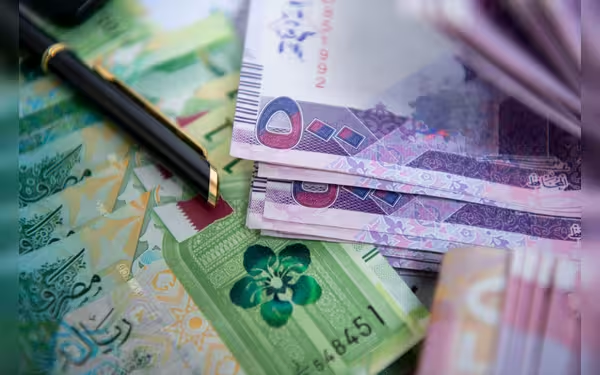Saturday, November 16, 2024 03:16 PM
Qatar Banking Sector Achieves $550 Billion in Assets
- Qatar's banking assets reach $550 billion.
- Domestic deposits surge by 11.4 percent.
- Qatar's economy projected to grow by 2.1 percent in 2024.
 Image Credits: arabnewspk
Image Credits: arabnewspkQatar's banking sector shows robust growth with assets hitting $550 billion, driven by rising domestic deposits and economic diversification efforts.
Qatar's banking sector has recently showcased impressive growth, with total assets of commercial banks reaching a staggering 2 trillion Qatari riyals, equivalent to approximately $549.9 billion. This remarkable increase of 6.4 percent year-on-year was highlighted in the central bank's July Monthly Monetary Bulletin. The data reflects a thriving financial environment in Qatar, which is crucial for the country's ongoing development and economic diversification efforts.
One of the standout features of this growth is the significant rise in domestic deposits, which surged by 11.4 percent to 833.1 billion riyals. This indicates that more individuals and businesses are placing their trust in local banks, contributing to the overall stability of the financial system. Additionally, total domestic credit climbed by 7.3 percent, reaching 1.3 trillion riyals, further demonstrating the banks' role in supporting economic activities.
The broad money supply also saw an expansion of 6.4 percent, amounting to 727.4 billion riyals. This increase is a clear sign of the sustained momentum in Qatar's financial landscape, aligning with the objectives set forth in Qatar's Third National Development Strategy for 2024-2030. This strategy aims to enhance financial services, which are essential for fueling national development and driving economic diversification.
Moreover, an analysis by Standard Chartered has predicted that Qatar is on track to restore government revenues to levels seen before the 2014 oil price shock and potentially double its economy by 2031. This optimistic outlook is attributed to Qatar's strategic position in the global energy market and its ongoing efforts to diversify its economy. The country is recognized as the world's sixth-largest gas producer and holds the third-largest natural fuel reserves, allowing it to benefit from rising hydrocarbon prices.
In addition to its energy sector, Qatar's non-oil economy is also experiencing steady growth, now contributing two-thirds of the nation's gross domestic product. The international profile of Qatar has been further elevated since hosting the FIFA World Cup in 2022, which has significantly boosted its global presence. According to the International Monetary Fund, Qatar's economy is projected to grow by 2.1 percent in 2024, with an acceleration to 3.2 percent by 2025.
Furthermore, Standard Chartered anticipates continued growth in the liquefied natural gas sector, which will further bolster the country's economic expansion in the coming years. Beyond the energy and banking sectors, Qatar is making notable strides in the sukuk market. In August, Estithmar Holding, a Qatar-based company, issued a 500 million riyal sukuk, marking a historic milestone as the first corporate issuance denominated in local currency under its 3.4 billion riyal program.
Mohamad bin Badr Al-Sadah, the group CEO of Estithmar Holding, expressed pride in this achievement, stating, "The issuance of the first corporate Qatari-riyal-denominated sukuk is a historic milestone for Estithmar Holding." This issuance has attracted significant interest from a diverse range of investors, especially after being listed on the London Stock Exchange’s International Securities Market.
Qatar's banking sector is not only thriving but is also playing a pivotal role in the country's broader economic strategy. With a focus on diversification and sustainable growth, Qatar is well-positioned to navigate the challenges of the global economy while continuing to enhance its financial services. As the nation moves forward, the ongoing developments in its banking and financial sectors will undoubtedly contribute to a more robust and resilient economy.













